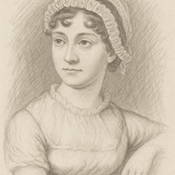
Artistic sketch of Jane Austen. For editorial use only.
Jane Austen
Playwright
Biography
Jane Austen
Born in England's Romantic literary era, Jane Austen's novels have become synonymous with social and sentimental critique wrapped in domestic and romantic dramas.
Much of her life is a mystery, and scholars have cobbled together a picture of her from her writings and biographical notes from family or friends. Austen's father was an Anglican rector, and her family lived modestly. However, she was able to attend Oxford for a short while; after catching typhus and nearly dying, she studied at home.
Theatre was an influential part of Austen's life; friends and family staged private productions of popular plays, including those by Richard Brinsley Sheridan and David Garrick. The comic timing of these plays certainly influenced Austen's later satiric wit. In a relatively short period of time, she was able to compose some of the most significant novels in English literature, many of which have been adapted for the stage and screen: Sense and Sensibility (1811), Pride and Prejudice (1813), Mansfield Park (1814), Emma (1816), Northanger Abbey (1818, posthumously), and Persuasion (1818, posthumously).
Austen died at the age of 41 from a chronic illness.
Known For
Shows
Shows associated with Jane Austen
Monologues
Monologues from shows associated with Jane Austen
Songs
Songs from shows associated with Jane Austen
Scenes
Scenes from shows associated with Jane Austen
Videos
Videos associated with Jane Austen
Additional Information
N/A